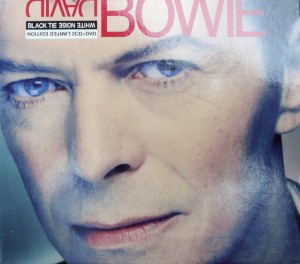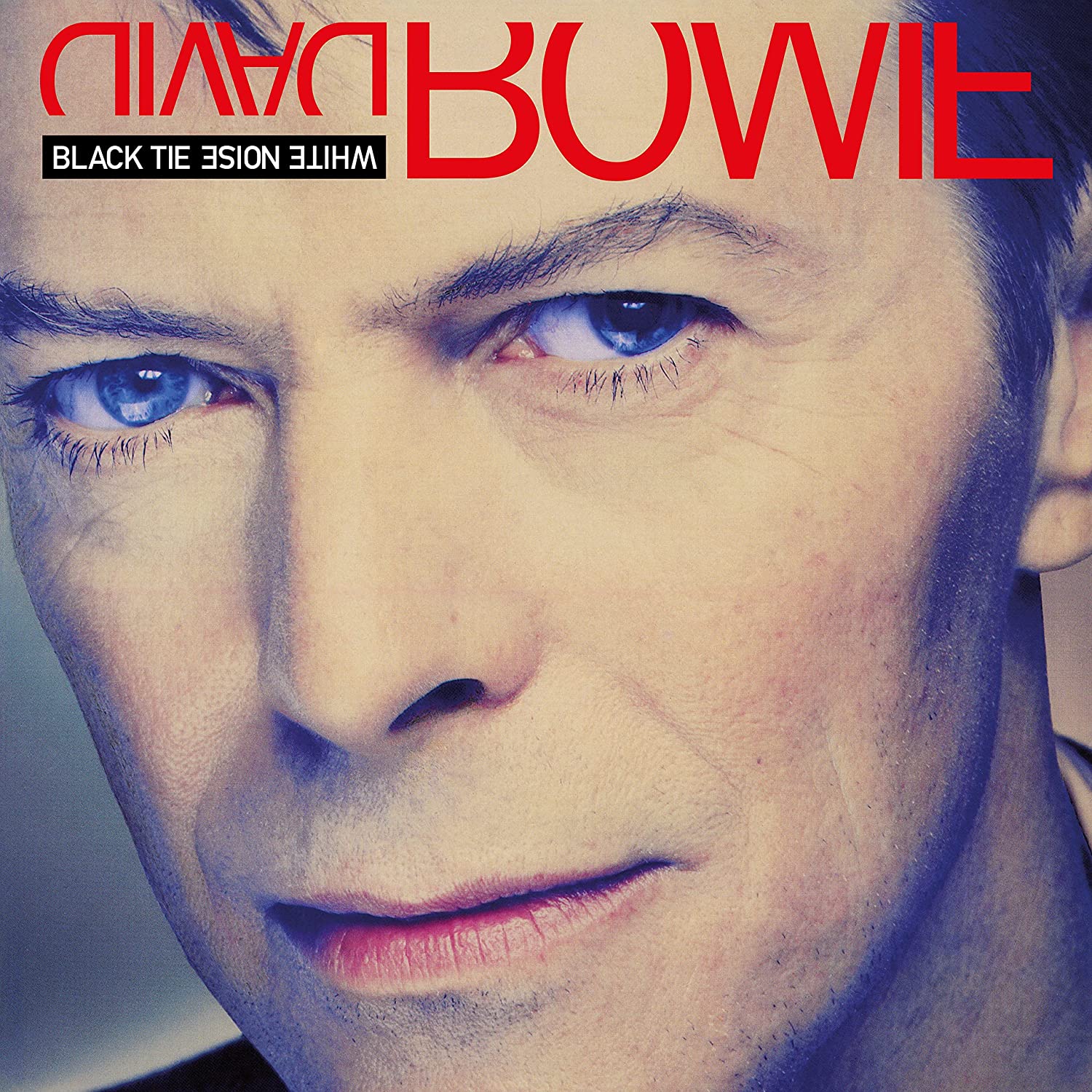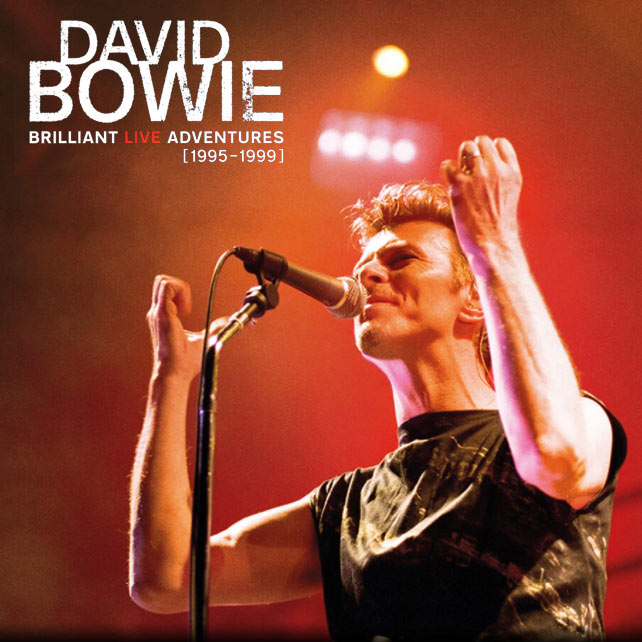Looking back at David Bowie's Black Tie White Noise
To celebrate the fact that Black Tie White Noise was 22 years old yesterday, SDE is revisiting this feature on the album that was originally published back in 2012…
Black Tie White Noise was released in 1993 – a tricky year for David Bowie and something of a new beginning. To make sense of it, we need to take a brief look back at the preceding five year period.
His last solo album had been the critically-mauled Never Let Me Down from 1987. The at-the-time heavily-mulleted ‘London Boy’ then unwisely decided to tour the album, and to make things worse this involved dragging a massive glass spider around the world, under which he would perform. By the time all this was over his reputation had taken a bit of a battering and he knew it. Bowie temporarily called time on his solo career, grew a beard and formed Tin Machine, a ‘no-bullshit’ rock outfit with his mates from the ’70s (Tony and Hunt Sales) and unknown guitar guru Reeves Gabrels.
Tin Machine, the album, is actually a rather good clearing-the-decks exercise – in Bowie’s words an “invigorating value-finder”. An attempt to shed all the excesses of the ’80s and go ‘back to basics’. However, after an initially positive reaction, the critics couldn’t resist the easy target that was a serious, furrowed brow Bowie, who constantly insisted that Tin Machine were a ‘proper band’ of equals rather than just his David Bowie’s backing band.
After touring the first Tin Machine album Bowie decided he wanted to be ‘David Bowie’ again, and set about on a massive re-issue campaign. His extensive back catalogue from the 1970s was reissued with previously unreleased bonus tracks under the Sound+Vision banner, and Bowie then set out on a coffer-filling world tour, where he would play his old classic hits “for the last time” (he has since continued to play them on subsequent tours!).
Having completed this epic tour, Bowie’s next move – surprisingly – was to release another Tin Machine album. Actually recorded before the Sound+Vision tour, Tin Machine II used the same musicians, but was a critical flop and a commercial failure despite a more polished production than on the first album. After another Tin Machine tour, documented on the live album Oy Vey Baby (not even for completists) Bowie had grown tired of the band and was keen to produce another solo album.
He ended up doing what he has done often throughout his career, and that was to seek out an old collaborator from the past.
Nile Rodgers would be that collaborator. Rodgers had produced Let’s Dance, Bowie’s massive, commercial hit album from 1983. This was the album that both ensured Bowie’s long-term financial security and brought him to a mainstream rock/pop audience. Some would argue that it also lead Bowie into an abyss – the bleak midwinter that was ’80s corporate rock. There is no doubt that 1984-1988 were the Bowie wilderness years, from a critical standpoint. His profile remained high and he had hit records, but the creative, experimental and essential artist of the 1970s was largely absent.
Choosing Nile Rodgers was an interesting move. During the ’80s he had worked with the likes of Madonna and Duran Duran, and together Bowie and Rodgers were certainly more than capable of producing some very commercial music, but in 1992/3, as he tried to re-establish some artistic credibility was David Bowie interested in doing this?
The first track that they put out from their sessions in 1992, was Real Cool World, the title song to the movie Cool World. A slightly low-key track, it was released in August 1992 to little fanfare or promotion and limped to no. 53 in the UK charts. If the song was a little disappointing, the production of the record would give fans a big clue as to how the next solo album would sound.
It wasn’t until March the following year that the first single from Black Tie White Noise was released. Since hardly anyone had bought or even been aware of Real Cool World, the single Jump They Say was marketed as Bowie’s ‘comeback’. An excellent video, lots of remixes and good promotion all round resulted in the song peaking at no. 9 in the UK charts. This still stands as Bowie’s last top ten hit in the UK [Where Are We Now? has since charted at no. 6]
The album followed in April – Black Tie White Noise was a twelve track album – three were instrumentals (if you count Pallas Athena), four tracks were covers of other people’s songs and only three vocal tracks (i.e. proper songs) on the album were authored by Bowie alone. On the face of it Bowie fans might have been forgiven for approaching this one with caution.
However against the odds, Black Tie White Noise turned out to be a fantastic return to form.
The record had a very distinct, semi-industrial, digital funk/pop sound and can be identified by it’s generous helpings of Bowie’s heavily treated sax and the trumpet of his namesake, Lester Bowie. Guitars are used sparingly and tend to be low in the mix. Anyone hoping for Let’s Dance part II would be left disappointed.
The opener, The Wedding (an instrumental version of The Wedding Song which closes the album), was Bowie’s tribute to his new wife Iman. The passion and commitment in his saxophone performance on this track is mighty impressive and starting with an instrumental works remarkably well.
One of the album highlights is You’ve Been Around. Originally a Tin Machine track which never made the grade, it was co-written by guitarist Reeves Gabrels. It’s a dark and brooding track and Bowie seems to create a memorable melody from nowhere as he sings over an industrial beat with only a hint of rhythm guitar “You’ve been around but you’ve changed me“. The bonus CD of remixes has the previously unreleased full-length Dangers 12” Remix version of this track which is even better than the album version. It doubles the beats and the menace.
I Feel Free is a cover of the Cream song and is notable because it features Bowie’s old mucker, Mick Ronson, but if truth be told, it’s a bit of a plodder.
Black Tie White Noise, the title track, is Bowie’s first hand account of the LA riots of 1992. Apparently, he was on his way to a black tie event when it all kicked off, hence the title. This track epitomises the album – its very ambitious, with a funky R&B chugging beat, overlapping lead vocals (Al B. Sure! guests on this track), pianos, sax, trumpets and a slightly rambling vocal melody that snakes its way around music. Basically, it’s a bit of a mess, but somehow Bowie just about pulls it off. You get the impression that he probably worked for ages on this one to get it right and it smacks of perspiration rather than inspiration. It’s a flawed piece of work, but an excellent track nonetheless. This was released as the second single from the album.
Other tracks of note are Nite Flights – an excellent cover of the Scott Walker song – and Pallas Athena which plays like a modern update on one of those Low/Heroes instrumentals.
Miracle Goodnight is the nearest thing to a ‘catchy’ pop song on the album. A predictable choice for the third single and an unabashed love song for new wife Iman, it peaked at number 40 in the UK charts.
The one track on the album that dispenses with trumpets, saxophones, and all the Nile Rodgers production values is I Know It’s Gonna Happen Someday a cover of the Morrissey track from his Your Arsenal album (produced by Mick Ronson). Bowie had spotted that this track was a bit of a “parody of Rock and Roll Suicide“, his song from 1972’s Ziggy Stardust and the Spiders from Mars, and decided it would be fun to record a version of his own as if it were “1974-ish”. It’s a straightforward piano torch-song treatment and works beautifully.
Black Tie White Noise ultimately succeeds by being greater than the sum of its parts. Niles Rodgers does a great job with the production and there is a consistency of tone and instrumentation that elevates some of the lesser tracks. It’s by no means a mainstream pop/rock album. Bowie was not going to make the same mistakes again, as he had done with Tonight (1984) and Never Let Me Down (1987).
As a love letter to his wife Iman and probably the best sax work of his career, here was an album that he really could claim to have put his heart and soul into. It’s an overlooked gem, and although currently out of print, if you don’t already own a copy you’d do well to try track down this 2003 reissued version through the usual channels.
2003 Reissue Details
In the UK the CD version of the album came with two bonus tracks: Lucy Can’t Dance (a track from the sessions) and Jump They Say (alternate mix). This is a bit of a shame because the album is bookended nicely by The Wedding/The Wedding Song and the bonus tracks somewhat upset the flow and balance of the running order.
One of the benefits of the 2003 2CD+DVD reissue is that on CD 1 these bonus tracks are omitted and the main 12-track album stands alone.
Black Tie White Noise CD 1
- • The Wedding
- • You’ve Been Around
- • I Feel Free
- • Black Tie White Noise
- • Jump They Say”
- • Nite Flights”
- • Pallas Athena”
- • Miracle Goodnight
- • Don’t Let Me Down & Down
- • Looking for Lester
- • I Know It’s Gonna Happen Someday
- • The Wedding Song
Black Tie White Noise CD 2
CD 2 is full of remixes but the selection is very intelligent since many mixes are either promo-only (therefore commercially previously unreleased) or are from a vinyl variant of a single (i.e. making it’s debut on CD).
Real Cool World and Lucy Can’t Dance are mopped up on this CD also.
- • Real Cool World
- • Lucy Can’t Dance
- • Jump They Say (Rock Mix)
- • Black Tie White Noise (3rd Floor US radio mix)
- • Miracle Goodnight (Make Believe mix)
- • Don’t Let Me Down & Down (Indonesian vocal version)
- • You’ve Been Around (Dangers 12″ mix)
- • Jump They Say (Brothers in Rhythm 12″ remix)
- • Black Tie White Noise (Here Come Da Jazz)
- • Pallas Athena (Don’t Stop Praying remix no. 2)
- • Nite Flights (Moodswings Back to Basics Remix)
- • Jump They Say (Dub Oddity)
Black Tie White Noise DVD
The DVD was originally release as a VHS tape back in 1993. The tracks marked with an asterisk are in-the-studio performances directed by David Mallet, who has worked with Bowie previously, most notably on the Ashes to Ashes video. These performances are the least interesting part of the DVD. A suited and booted Bowie mimes to the tracks in an artily-lit studio and it all comes across as a little po-faced. Much more fun are the snippets of interview with Bowie which appear in between these performances. He talks interestingly, amongst other things, about his sexuality, drug intake, and his thoughts on marriage. The three official promo videos at the end are all excellent, especially Jump They Say. Sound is Stereo PCM 48 khz / 16 bit.
- • With Lester Bowie
- • On Reeves Gabrels
- • You’ve Been Around*
- • Expanding and Experimenting
- • Nite Flights*
- • Otherness”
- • Miracle Goodnight*
- • On Marriage”
- • Black Tie White Noise*
- • With Mick Ronson
- • I Feel Free*
- • With Nile Rodgers
- • I Know It’s Gonna Happen Someday*
- • “Miracle Goodnight” (promo video)
- • “Jump They Say” (promo video)
- • “Black Tie White Noise” (promo video)
2003 Reissue Picture Gallery
Click on a thumbnail to enlarge.
27 Comments
27 thoughts on “Looking back at David Bowie's Black Tie White Noise”
Leave a Reply
You must be logged in to post a comment.



![David Bowie / Brilliant Adventure [1992-2001] 18LP vinyl box set](https://newsite.superdeluxeedition.com/wp-content/uploads/2021/09/propercover.jpg)


I love Jump They Say ( a real classic single) and enjoy his attempt at What’s Going On for the 90’s with the title track. I was massively disappointed with his cover of Mozzer’s great I Know… although now with nostalgic hindsight I quite enjoy it. His version of I feel Free is a shocker though. A mixed bag of an Lp.
I’ve just upgraded my amplifier from an old generic bit of crap to a Cambridge Audio and the sonic space that this has added to my stereo is great and this album is one of the albums that has really benefitted from the change. Very by the Pet Shop Boys being another.
Thanks for the write-up Paul. Have you read Yeah Yeah Yeah by Bob Stanley? Awesome book on the history of Pop from 1957-97
This is probably one the best ‘later Bowie albums’, IMHO!
Yes, the Buddha Of Suburbia was also 1993…the album was released in the UK that November…for me, it was the precursor to 1.Outside, not only sharing some songs but the whole vibe was much less polished.
I played all of BTWN (plus Real Cool World) the other night on my “proper” stereo and it sounded fantastic. They simply don’t make music like that anymore.
I am somewhat staggered by the fact that this whole article makes no reference to the soundtrack for The Buddha of Suburbia, released (if i am not mistaken) the same year as BTWN, if not just before?
As much as i love Tin Machine, these two albums within one year was really the year the world got Bowie as he is known, loved, respected, admired worshipped, back.
I love “Buddha”. You’ve probably read this, but I chatted to Erdal Kizilcay about that album at the end of 2013
http://www.superdeluxeedition.com/interview/bowie-collaborator-erdal-kizilcay-on-glass-spider-and-never-let-me-down/
Miracle Goodnight is my favourite. Although, there are some other great ones there.
R
This album came as a great relief after the bomb of Tin Machine. I’ve been a Bowie fan since the release of Diamond Dogs and have followed him faithfully since 1974. Tin Machine did nothing for me. I wonder sometimes if Bowie had not hooked up with Niles for Let’s Dance where Bowie’s music would be today. Let’s Dance after Scary Monsters and his Trilogy made no sense to me. But BTWN followed in the footsteps of Let’s Dance and brought Bowie Jazz to the forefront which seems predominant in his outings to follow. I like BTWN – except for that one song. You all know what song I mean.
Love the leftfield remix of JTS and the video was very cool at the time.
One of the most terrible Bowie LPs to be reissued too. Only for nostalgia and completists/die hard fans, who like. Not ageing well unfortunately; rest in piss…
can’t agree there- an enjoyable Bowie album with some very good singles/remixes. during a a time of musical flux this did it’s own thing very well. looking above i concur – ‘Jump They Say’ is a stormer.
I remember buying the album when it was first released. Unfortunately I gave it away not knowing that I would become a big David Bowie fan in later years. I live in the US and I can’t seem to get the CD online or at the stores anywhere around here. I wish it would rereleased soon!
it looks pretty readily available on Amazon
I loved the lead single “Jump They Say” (not least because of the superb video clip). Also, “Nightflights” and “Miracle Goodnight” (why not this song as the second single?) were excellent.
“Jump They Say” was the track that got me interested in BTWN – saw the video somewhere, and being a sucker for all things Alphaville, I had to have the whole package. Interesting album to say the least, uneven IMHO, but there are some good tracks here. I like the rock mix of Jump, but now I understand why the guitars were so toned down on the album mix. Good to know – thanks!
Nite Flights (Moodswings Back to Basics Remix) is excellent.
I always liked Never Let Me Down (unfairly maligned due to glass spiders), and enjoyed both Tin Machine albums to some degree, so I never really felt he’d lost his way quite as badly as some clearly felt at the time. Anyone who can record I Can’t Read or You Belong In Rock N Roll during their “lost it” years is clearly something special.
Is this album really 22 years old this week? Bloody hell, so it is! April 5th 1993, two weeks after Depeche Mode’s Songs of Faith, and a week after Suede’s much-lauded debut left me cold. Black Tie.. easily became my favourite album of the year, until Wild Wood appeared about 6 months later. It’s just so fresh-sounding, and full of experimentation, and yet always somehow commercial.
For a long time, this was my go-to Bowie CD…at least until the wonderful double-whammy of Heathen and Reality.
One of my favourite Bowie albums and one that receives more repeat plays than Outside or Earthling. Can’t say it was ‘a return to form’ for me as I loved both Tin Machine albums (and still do), so my palate was already cleansed after the dodgy ’80s. Brilliant songs (including Jump They Say, one of his best), some well-placed experimental pieces and a great choice of covers – standard Bowie classic.
Great album!
Too bad they didn’t put on CD2 one of Bowie’s best remixes :
Miracle Goodnight (7″ 2 Chord Philly Mix)
Not one of Bowie’s best,but still worth purchasing for his incredible version of ‘Night Flights’
It’s a bummer that latter-day albums have gotten various interesting reissues (this release, the Bowie box, The Next Day extra) but much of his output remains outdated in terms of deluxe treatment. Low through Let’s Dance could desperately use some catalog initiative
Hasn’t Low been decided somewhere as being the album most desired by fans for a deluxe treatment? I consider myself lucky to have gotten into Bowie during the Ryko campaign, with two of Low’s bonus tracks being essential. Those are just about the few remaining albums I think I’d buy over again for a deluxe treatment.
Nice to see this article. Can’t believe it has been 22 years!
I love this album and have loved it since it was released…
I remember seeing the first showing of the Jump They Say video on some UK TV show. I thought the video and song were fantastic and a real return to form. It really made me look forward to the album (the first time I had looked forward to a Bowie release for since Let’s Dance).
The album I actually find universally good… apart from one song: Bowie’s cover of “I know it’s gonna happen…”. Can’t stand the original, can’t stand Bowie’s version – so much so that I have to skip it (and didn’t bother ripping it to my iPod).
One thing you didnt seem to mention (although I might have missed it) was that Nile was not actually very happy with the album at the time because he was expecting to create Let’s Dance 2 whereas Bowie wanted to get back to more experimentation after the more ‘straight’ albums Tonight and Never Let Me Down.
I think that is what makes the album work so well for me – it has pop, funk, jazz and some of classic Bowie left-field writing as well. A real hodgepodge that shouldn’t work but does!
For me there is not a duff track on the album (apart from the aforementioned one) and it even got me into The Walker Brothers’ Nite Flights album. I love ‘I Feel Free’ by the way – I’ve actually DJ’ed it many times with much success not what I would consider a plodder…
Definitely one of my favourite latter-day Bowie albums – although actually I find the run from Black Tie to The Next Day pretty consistently interesting and entertaining. Many don’t seem to like Hours, Outside and Earthling but I find these pretty rewarding listens.
For me though BTWN was definitely where he rediscovered his ‘songwriting mojo’.
One of Bowie’s more underrated albums. There is a lot of treasure here.
I enjoy playing piano along with music in my collection, and few moreso than Jump They Say. Mike Garson did it better on the Outside tour–him not appearing on the studio track is just about its only flaw. The album itself is hit and miss, and precedes some stronger material, but that track is just astonishingly good.
I have quite a few CDs that I bought and filed away that I never yet found the time to play. This is one of those. I didn’t get round to playing this one until last year. So it had been filed away for about 11 years, looking pretty.
I bought a couple of Bowie box sets last year and enjoyed playing those so much that I finally decided to give this a listen. I wasn’t convinced that I would like Bowie from this period, but it was excellent. The only track I didn’t like was the “Don’t Let Me Down & Down (Indonesian vocal version)”. Apart from that, I really enjoyed the rest of it.